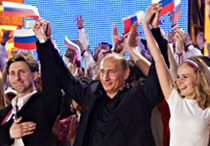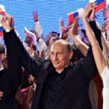
REBIRTH OF AGITPROP: RUSSIA’S SPENDING ON PATRIOTIC PROPAGANDA WILL TRIPLE
Publication: Eurasia Daily Monitor Volume: 2 Issue: 142
By:

On July 18, the Russian government adopted a special federal program of patriotic education that will promote national and state values through the year 2010. The blueprint was reportedly lobbied by Russia’s siloviki — the omnipotent representatives of the defense and security agencies — and reflects the strategic outlook of the present-day Kremlin rulers with its pronounced anti-Western bias.
Approximately 500 million rubles ($18 million) will be allocated to support films, festivals, competitions, software development, and the promotion of Russian state symbols and the national anthem. The program will also earmark funding to “confront attempts to compromise and devaluate patriotic ideals in the mass media, literature, and art.”
The allocated sum indicates that government spending for patriotic education will rise threefold for the next five years. The program, which is a continuation of an initiative launched in 2001 when $6.4 million was earmarked for patriotic education through 2005, seeks to encourage and increase patriotism among all generations and categories of citizens, according to a document signed by Prime Minister Mikhail Fradkov. “However, the priority target of the program is children and youth,” the program states.
Part of the program’s funding will go toward setting up regional offices to coordinate patriotic education across the country, the document says. In a separate move last May, the government launched the Zvezda television channel as a way to nurture patriotism.
According to Russian media reports, the adoption of the new patriotic program is mainly the result of aggressive lobbying by top officials from the defense and security structures. Until very recently, the status of this program remained uncertain — some sources claim the blueprint was missing from the list of the special federal programs for the next five-year period that the government was supposed to endorse at the beginning of July. But it turned out that a number of Russia’s political heavyweights were pushing very hard to have the patriotic education program approved. According to Viktor Ozerov, the head of the Federation Council Committee on Defense and Security, several lawmakers from his committee as well as the defense ministry’s top brass and a number of Russian military-connected NGOs officially appealed to President Vladimir Putin, asking for his personal support in pushing the program through the governmental bureaucracy. The Kremlin leader appeared to favor the concept, and the document was finally adopted.
Meanwhile, the gathering of the representatives of the pro-Putin youth group Nashi (Ours) at the summer camp on the shores of Lake Seliger in Tver oblast speaks volumes about the kind of patriotic propaganda that will be on offer as well as about the nature of the political philosophy behind the program. Nashi’s leader Vasily Yakemenko said the camp where more than 3,000 of the group’s members from throughout Russia are undergoing training, is intended “to prepare the cadre’s revolution in Russia,” adding “We are training nationally oriented managers who will provide Russia’s global leadership in the 21st century.”
It is no secret that Nashi has emerged under the aegis of the Kremlin. Thus it is quite remarkable that, while addressing the group’s activists during the two-week camp, Vladislav Surkov, deputy head of the Putin presidential administration, specifically called on the “commissars,” as they tellingly labeled themselves, to “protect [Russian] youth from the impact of the West.”
Besides the top Putin aide, all of the other “usual suspects” — the Kremlin-connected spin-doctors Gleb Pavlovsky, Vyacheslav Nikonov, and Sergei Markov — showed up at the Lake Seliger camp to give “lecture courses” to the “young Russian patriots.” There is a dearth of information on what exactly the Kremlin political consultants were lecturing Lake Seliger in the Tver woods. But the text of Pavlovsky’s lecture to Nashi’s activists in St. Petersburg on June 18 is readily available. The thrust of that message was that the disintegration of the Soviet Union — which he believes was not inevitable — had led to the collapse of the world order where the Soviet empire was an undisputed superpower. The contours of the new world order are just emerging, and the international players are aggressively competing for the place under the sun. Russia, Pavlovsky asserts, should be extremely vigilant as the other centers of power are seeking to weaken and even “dismantle” it, if they are provided a chance.
The “fortress mentality” and the ideology of anti-Westernism appear quite widespread among certain segments of the Russian political elite. The fact that these ideas might form the foundation of Russia’s new patriotic program cannot fail to worry the leading Western countries, as such political outlook clearly undermines Moscow’s stated policy of gradual integration into the world community.
(Kreml.org, June 24; TV-Tsentr, July 18; Moscow Times, Gazeta.ru, Politcom.ru, RFE/RL, July 19; Nezavisimaya gazeta, July 21)




